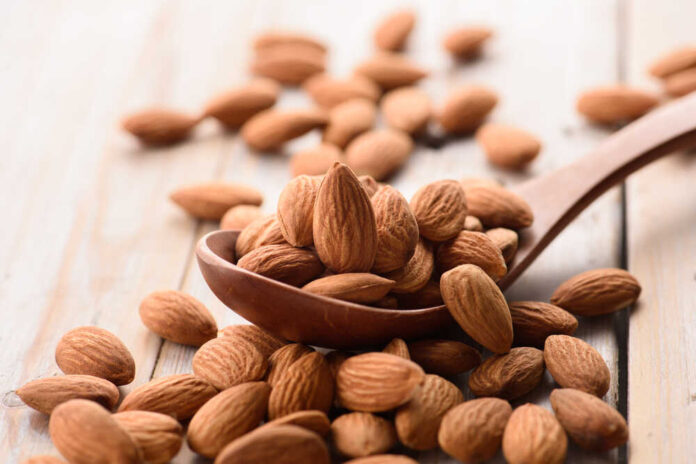
As athletes and fitness enthusiasts strive to reach their maximum potential, they are constantly seeking out ways to improve their performance and aid in recovery.
One food that has been gaining popularity in recent years as a powerful tool for muscle recovery is almonds. But what makes almonds so special, and are they truly the superfood for muscle recovery?
Studying Almonds With Experimental Testing
A new study published in Frontiers in Nutrition aimed to determine if eating almonds could improve post-exercise recovery.
This small study looked at 64 non-obese adults between the ages of 30 and 65 who were not regularly doing resistance training. These adults were randomly assigned to one of two groups:
● eat 2 ounces of almonds (about 45 almonds)
● eat a cereal bar with the same amount of calories
After 4 weeks of eating their assigned snack food daily, the participants underwent one single 90-minute session of intense exercise. This session included bench presses, leg strength tests, a 30-second all-out sprint, a 50-meter shuttle run test, a vertical jump test, and more.
Immediately after the exercise session, the researchers took urine and blood samples from each participant, plus follow-up samples every day for the next 4 days.
Almonds Helped More Than Cereal Bars
It was already known and expected that the intense workout would cause delayed onset muscle soreness (DOMS), inflammation, reduced energy and strength the following day, and minor mood disturbances.
But the results showed that the group who ate almonds experienced less fatigue and tension compared to the cereal bar group. The almond group also had higher levels of leg and back strength, and lower levels of muscle damage markers in their blood.
Additionally, the study found that those who ate almonds had a more positive metabolic response to the workout, as evidenced by the levels of certain beneficial compounds in their blood and urine.
The Power of Almonds
So what makes almonds so special for muscle recovery?
Almonds are a rich source of antioxidants, healthy fats, protein, and fiber. These nutrients help to reduce inflammation in the body, repair damaged muscles, and improve overall health.
Moreover, almonds contain magnesium, which is essential for muscle function and can help reduce muscle soreness after exercise. Almonds also have vitamin E, which has been shown to help reduce oxidative stress in the body, leading to improved recovery and reduced muscle damage.
Are Almonds the Superfood for Muscle Recovery?
Based on the results of this study, it seems that almonds could play a positive role in post-exercise recovery.
However, it is important to note that this study does have some limitations.
It was a small study with only 64 selected participants, and the testing period only lasted for 4 weeks. Further research is needed to fully understand the impact of almonds on muscle recovery, as well as to determine the optimal amount of almonds that should be consumed for optimal benefits.
Future studies may also need to compare the effects of almonds to similar foods. It’s not yet entirely clear if almonds possess a unique capability to help muscle recovery—other nuts and seeds may provide similar benefits.






















